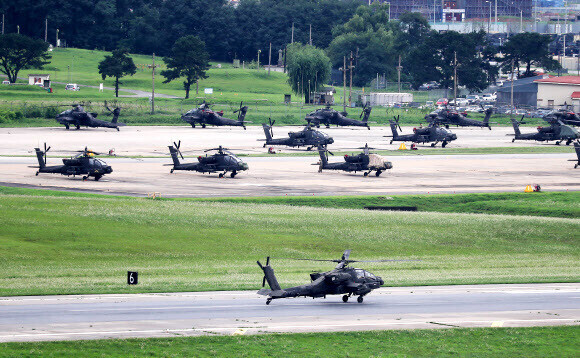hankyoreh
Links to other country sites 다른 나라 사이트 링크
[Editorial] The OPCON transfer may be difficult but is absolutely necessary

South Korean President Moon Jae-in’s plan to complete the transfer of wartime operational control (OPCON) of South Korean forces before he leaves office is looking less and less feasible. The problem is that South Korea and the US have scaled down the joint exercise scheduled for Aug. 16-28, causing some components of the verification of full operational capability (FOC) of the future Combined Forces Command (CFC), a necessary step toward OPCON transfer, to be pushed back until next year. That would cause a comparable delay in full mission capability (FMC) verification, the final assessment stage currently scheduled for next year, creating uncertainty about whether the transfer could even take place before Moon’s term in office concludes in May 2022. The OPCON transfer shouldn’t be postponed until the next administration. The Moon administration needs to make thorough preparations as it strives to carry out the OPCON transfer before Moon leaves office.
No time should be wasted in moving ahead with the OPCON transfer, which signifies South Korea’s recovery of its military sovereignty. South Korea and the US agreed to the OPCON transfer in principle back during the Roh Moo-hyun administration, but the transfer has been delayed until now largely because of the inaction of the Lee Myung-bak and Park Geun-hye administrations.
The Lee administration postponed the OPCON transfer from April 2012 to December 2015, citing North Korea’s nuclear weapons program and a North Korean attack that sunk the ROKS Cheonan. The Park administration decided that the transfer should only take place after certain “conditions” had been met in terms of the South Korean military’s combined operations capabilities and the surrounding security environment, without giving any concrete timeline.
After what amounted to an indefinite postponement, South Korea is now finding itself hamstrung by these “conditional” transfer guidelines. It’s for this reason that former Korea National Defense University professor Moon Jang-ryul declared, “Leaving the [OPCON] matter up to an ‘examination’ that amounts to approval from the US military is effectively the same thing as setting up different traffic lights and then granting the US the power to give the green light.”
The decision to leave part of the examination until next year appears to bear some connections with the US adopting a more negative attitude on the South Korean OPCON transfer amid its “new Cold War” with China. The discussions on the joint exercises reportedly saw some friction between the US, which insisted that there should be drills to “prepare for North Korean threats,” and South Korea, which maintained that the focus should be on OPCON. With Washington pursuing an Indo-Pacific strategy aimed at countering Beijing, it may have determined that it would be more beneficial to hang on to South Korea’s OPCON to keep the Korean Peninsula as a strategic outpost against China.
In the past, it was a proactive stance from the US that set the ball rolling for the OPCON transfer. For it to drag its feet on the transfer now -- citing the need for various “examinations” -- is not a positive development. Rather than letting itself get roped in by the US’ arguments, Seoul needs to vocally insist on a swift OPCON transfer. Our leaders should bear in mind that without that transfer, our military will not be able to establish its own operation plans or develop its own operational command capabilities.
Please direct comments or questions to [english@hani.co.kr]

Editorial・opinion
![[Column] Park Geun-hye déjà vu in Yoon Suk-yeol [Column] Park Geun-hye déjà vu in Yoon Suk-yeol](https://flexible.img.hani.co.kr/flexible/normal/500/300/imgdb/original/2024/0424/651713945113788.jpg) [Column] Park Geun-hye déjà vu in Yoon Suk-yeol
[Column] Park Geun-hye déjà vu in Yoon Suk-yeol![[Editorial] New weight of N. Korea’s nuclear threats makes dialogue all the more urgent [Editorial] New weight of N. Korea’s nuclear threats makes dialogue all the more urgent](https://flexible.img.hani.co.kr/flexible/normal/500/300/imgdb/original/2024/0424/7317139454662664.jpg) [Editorial] New weight of N. Korea’s nuclear threats makes dialogue all the more urgent
[Editorial] New weight of N. Korea’s nuclear threats makes dialogue all the more urgent- [Guest essay] The real reason Korea’s new right wants to dub Rhee a founding father
- [Column] ‘Choson’: Is it time we start referring to N. Korea in its own terms?
- [Editorial] Japan’s rewriting of history with Korea has gone too far
- [Column] The president’s questionable capacity for dialogue
- [Column] Are chaebol firms just pizza pies for families to divvy up as they please?
- [Column] Has Korea, too, crossed the Rubicon on China?
- [Correspondent’s column] In Japan’s alliance with US, echoes of its past alliances with UK
- [Editorial] Does Yoon think the Korean public is wrong?
Most viewed articles
- 1‘We must say no’: Seoul defense chief on Korean, USFK involvement in hypothetical Taiwan crisis
- 2[Reportage] On US campuses, student risk arrest as they call for divestment from Israel
- 3[Column] Park Geun-hye déjà vu in Yoon Suk-yeol
- 4‘Weddingflation’ breaks the bank for Korean couples-to-be
- 5Korea sees more deaths than births for 52nd consecutive month in February
- 6N. Korean delegation’s trip to Iran shows how Pyongyang is leveraging ties with Moscow
- 7Amnesty notes ‘erosion’ of freedom of expression in Korea in annual human rights report
- 8Will NewJeans end up collateral damage in internal feud at K-pop juggernaut Hybe?
- 9N. Korean hackers breached 10 defense contractors in South for months, police say
- 10[Guest essay] The real reason Korea’s new right wants to dub Rhee a founding father